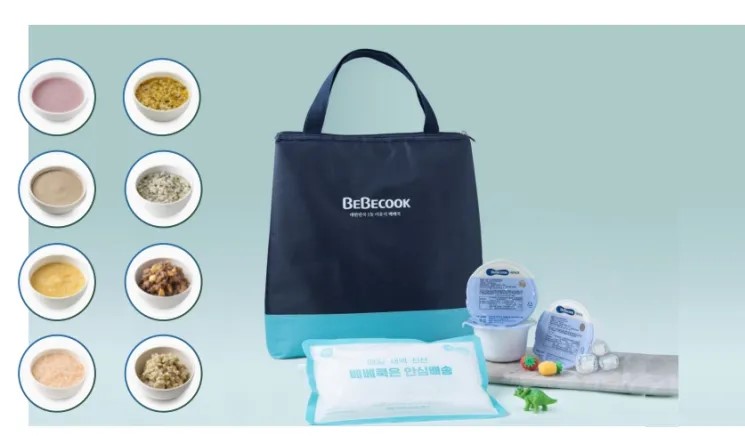Korean baby supplement brand BeBecook has achieved the top position in the South Korean Market. It boasts a market share exceeding 30%. Additionally, its Alvins brand, launched in 2004, has captured the second-largest market share. How did the company achieve such a high market share? What are the differences between the baby complementary food market in China and Korea? What is the future market outlook for baby complementary food porridge in China?

Recently, brand CLUB event held at the scene of Hi-Creation Week. Tao Sheng, General Manager of BeBecook China, delivered a presentation titled “Introduction of Korean Fresh Food Porridge Market and Outlook on the Chinese Baby Complementary Food Porridge Market“. According to Tao Sheng, BeBecook will launch a new series of baby complementary food for the domestic market next month.
01) Special Markets Breed Special Forms
With a land area of around 100,000 square kilometers, South Korea is a relatively small in size in 2023. South Korea’s total population was 51.09 million, with nearly half of the population centered on Seoul.
Among the OECD countries, South Korea is one of the developed countries experiencing significant aging alongside a declining birth rate.
From 2021 to 2023, the number of newborns in South Korea has been declining for three consecutive years, and the number of newborns in 2023 will be less than 230,000, which is 1/40th of the size of our country. Additionally, South Korea’s annual marriage data is also declining. “No love, no marriage, no children” is a crisis encountered in the maternal and child industry in South Korea.
South Korea, with a land area comparable to that of Zhejiang Province in China, spans approximately 100,000 square kilometers, making it a relatively small country in size. Despite its compact territory, South Korea housed a total population of 51.09 million people as of 2023. South Korea’s total population was 51.09 million, with nearly half of the population concentrated in the metropolitan area centered on Seoul.
Such national conditions suggest the baby market is very voluminous and has bred a special product form: fresh with complementary food porridge.
In Korea, the concept of complementary food is referred to as “ablactational food”. A search for “ablactational food” on Korean e-commerce platforms yields numerous brands and products of freshly prepared porridge in convenient bowls.
This is one of the characteristics of the Korean complementary food market, which is dominated by freshly prepared porridges. BeBecook is among the brands leading in this sector, and its core product is a freshly delivered porridge.
02) Korean Baby Porridge Market Traits
What specifically characterizes the Korean freshly prepared complementary porridge market?
Firstly, complementary food can generally be broken down into 10 stages.
Korean mothers, when introducing complementary foods to their babies, tend to rely on ready-to-eat fresh complementary food porridge options. They begin doing so from the early stages of weaning and continue up until their children transition to eating regular children’s meals, typically around the age of three. These purchases are frequently made on e-commerce platforms, often on a daily basis.
Secondly, it is led by cold chain daily fresh dispensing.
When consumers place an order, it will be delivered in the form of cold-chain delivery for daily fresh dispensing.
Why is it possible to achieve daily freshness in deliveries? Because the entire supply chain of freshly prepared porridge in South Korea developed a highly functional distribution network system.
Thirdly, the brand competition is intense, and the market for fresh baby food supplements is highly saturated.
According to Korean Statistical Office’s data, in 2023, the number of newborns in South Korea in 2023 reached 229,970,000. With a total fertility rate of 0.72, it sets record lows since the relevant records were made.
In a country where the number of newborns is so low, venturing into an industrialized sector such as this, coupled with the multitude of competing products, signifies that this is an industry characterized by high levels of internal competition and saturation.
Fourthly, the ingredients are localized, with grains and Hanwoo beef being the dominant components in baby food porridge recipes. This allows for daily production and delivery of non-repetitive items (numbering in the hundreds).
Similar to how Japanese people favor Wagyu beef, Koreans hold a preference for Hanwoo beef. Especially for the baby segment (porridge products or baby snacks), the localization of the ingredients involved can be almost 100%.
03) How BeBecook has Managed to Seize a Significant Portion of the Market?
Currently, BeBecook owns two brands of baby supplementary food in Korea: “BeBecook” and “Alvins”.
In South Korea, the business of freshly prepared complementary food porridge basically emerged around 2000. 25 years have passed by today, and working backwards from BeBecook’s data, almost the volume of the entire industry in South Korea is not more than RMB 2 billion, which is roughly 1/10-1/20 of the domestic market size.
In such a market environment, the two brands “BeBecook” and “Alvins” have managed to capture over 40% market share in the fresh food supplement market.
For BeBecook, how does its entire business model operate?
Firstly, most maternal and baby companies in South Korea have their e-commerce platforms. BeBecook also has its own mobile app. Consumers can choose different recipes every day after placing an order.
For BeBecook, they maintain a stable offering of nearly 500 unique recipes throughout the year, which means that consumers can have a different complementary porridge every day.
After receiving an order via the APP, BeBecook’s factory can produce the products on the same afternoon and start delivering it in the early hours of the morning. They deliver to over 10,000 households across South Korea, ensuring that mothers opening their doors every morning find a cold-chained delivery package at their doorstep.
There are a several key points to emphasize here. Firstly, all BeBecook’s fresh porridges are produced in its own factories and facilities certified to HACCP hygiene standards. Secondly, BeBecook has established partnerships with more than 40 regional distribution agents covering the entirety of South Korea.
Throughout this process, consumer loyalty to the brand is notably high. Essentially, once customers commit to a specific baby food brand like BeBecook, they often start feeding their infants from as early as five months old and continue until the child transitions to eating regular children’s meals.
04) Chinese vs. Korean Baby Complementary Food Comparison
Based on the differences between the Chinese and Korean baby complementary food porridge markets, Tao Sheng summarized the disparities between the two markets.
Chinese Baby Complementary Foods (Porridge)
- Preparation: Primarily homemade by individuals, supplemented with commercially available rice cereals, fruit purees, noodles, etc., for combined feeding.
- Variety according to age: Baby food porridge market is nascent; stage-specific segmentation under development.
- Nutrient composition: Emphasis is placed on the supplementation and balanced combination of nutrients.
- Infants’ complementary foods are limited due to their chewing abilities and digestive development stages. However, these types of foods are gradually becoming more diverse. Particle size and viscosity are tailored to suit different age-appropriate stages.
South Korean Baby Complementary Foods (Porridge)
- Preparation: Professional baby food companies manufacture fresh-delivered complementary food porridge brands using hygienically certified equipment, with extremely high usage rates.
- Variety according to age: Considering the nutritional needs and progression with age, rice cereals are enriched with vegetables, fruits, meats, and other ingredients. The market has already established a segmented, stage-based baby complementary food porridge system.
- Nutrient composition: No processed additives are used; only raw, unprocessed ingredients provide naturally balanced nutrient profiles.
- Particle size and viscosity tailored to age: Subdivided particle sizes and viscosities are provided according to the child’s age. Considering factors such as the number of teeth, digestive capacity, and various growth and developmental stages, the porridge is differentiated based on particle size and viscosity.
According to Tao Sheng’s prediction, the volume of the domestic baby complementary food market will exceed 30 billion. In terms of categories, the current domestic baby complementary food market is mainly focuses on rice cereals, purees, and porridges. The prepackaged baby purees and porridge categories have shown a 14% compound annual growth rate. This indicates a persistent upward trend in this market segment.
In conclusion, heightened demands from consumer groups contribute to unlocking more potential in this category. The frequent repurchase of baby complementary food porridge also plays a role. Additionally, the enhanced promotion and improvement of consumer education are expected to further boost this potential.
Keywords:
| baby feeding products showcase at tradeshow[1] |
| healthy food and snack options for toddlers[2] |
| Shanghai CBME 2024 product categories[3] |
| CBME 2024 baby nutrition and health[4] |






